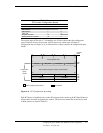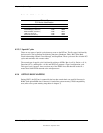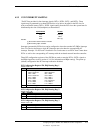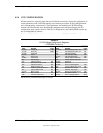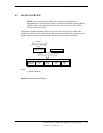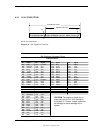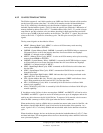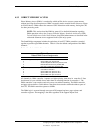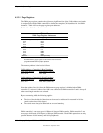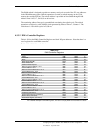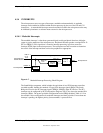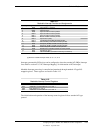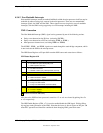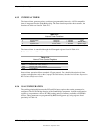
Technical Reference Guide
Compaq Deskpro 4000N and 4000S Personal Computers
First Edition - September1997
4-15
4.3.3 DIRECT MEMORY ACCESS
Direct Memory Access (DMA) is a method by which an ISA device accesses system memory
without involving the microprocessor. DMA is normally used to transfer blocks of data to or from
an ISA I/O device. DMA reduces the amount of CPU interactions with memory, freeing the CPU
for other processing tasks.
NOTE:
This section describes DMA in general. For detailed information regarding
DMA operation, refer to the Compaq Extended Industry Standard Architecture (EISA)
Technical Reference Guide. Note, however, that EISA enhancements as described in the
referenced document are not supported in this (ISA only) system.
The South Bridge component includes the equivalent of two 8237 DMA controllers cascaded
together to provide eight DMA channels. Table 4-8 lists the default configuration of the DMA
channels.
Table 4–8.
Default DMA Channel Assignments
Table 4-8.
Default DMA Channel Assignments
DMA Channel Device ID
Controller 1 (byte transfers)
0
1
2
3
Spare & ISA conn. pins D8, D9
Audio subsystem & ISA conn. pins B17, B18
Diskette drive & ISA conn. pins B6, B26
ECP LPT1 & ISA conn. pins B15, B16
Controller 2 (word transfers)
4
5
6
7
Cascade for controller 1
Spare & ISA conn. pins D10, D11
Spare & ISA conn. pins D12, D13
Spare & ISA conn. pins. D14, D15
All channels in DMA controller 1 operate at a higher priority than those in controller 2. Note
that channel 4 is not available for use other than its cascading function for controller 1. The
DMA controller 2 can transfer words only on an even address boundary. The DMA controller
and page register define a 24-bit address that allows data transfers within the address space of
the CPU. The DMA controllers operate at 8 MHz.
The DMA logic is accessed through two types of I/O mapped registers; page registers and
controller registers. The mapping is the same regardless of the support chipset used.



